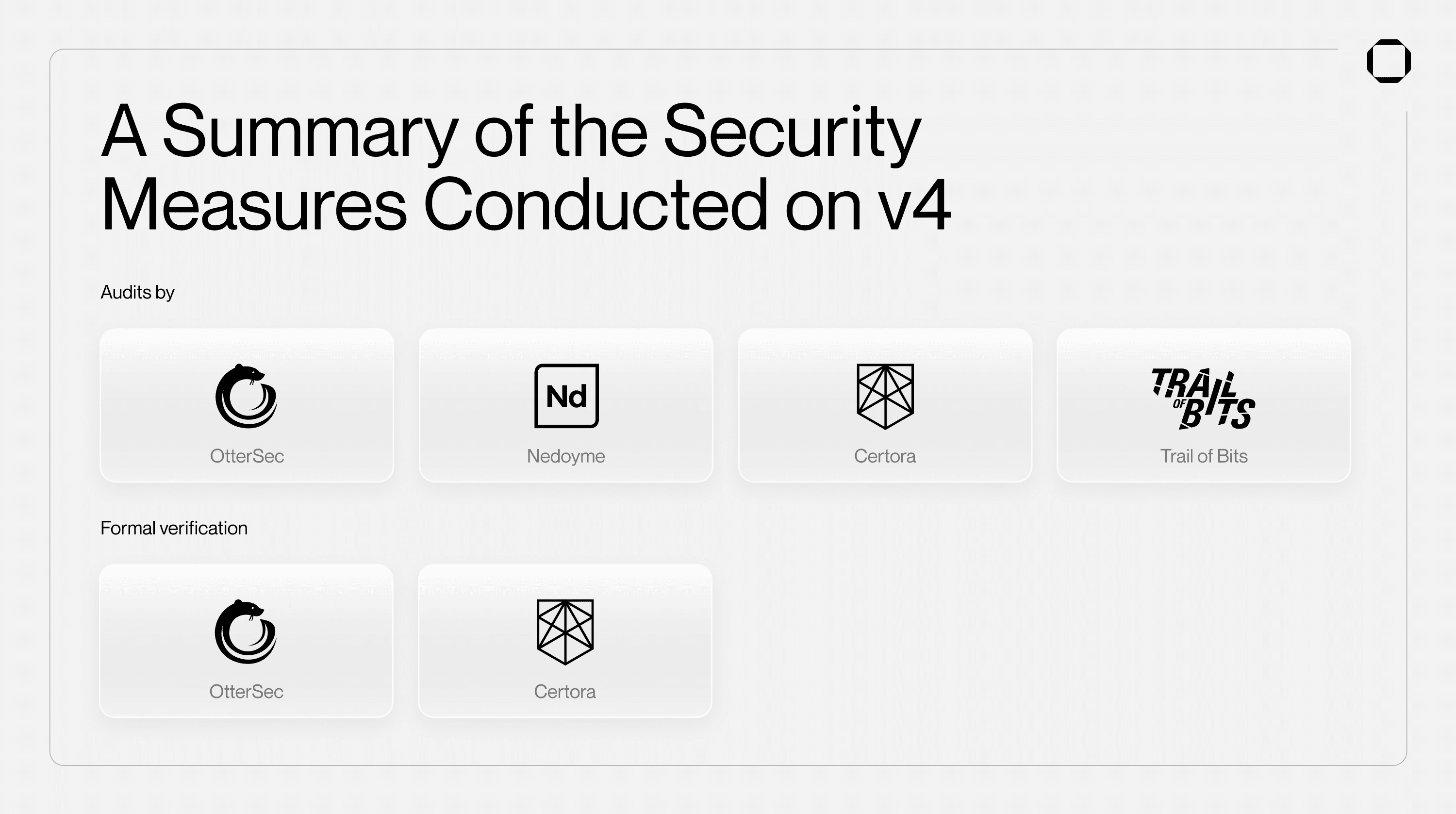On October 2nd of this year we released v4, our new and powerful program that expands the capabilities of multisig security for organizations operating on Solana, as well as Solana’s account abstraction use cases. Drawing from our experience with v3, we aimed to ensure that v4 follows the highest security standards.
Security is a continuous process that requires time and effort, especially for infrastructure projects like Squads upon which other projects rely for their operations. Regular security assessments and updates are a key part of our approach to ensure our codebase remains resilient against threats. Additionally, Squads Protocol's codebase is source-available (viewable here), and the programs have been written in Anchor, a framework for building secure Solana programs.
This article summarizes the security measures we have conducted on Squads Protocol v4, the codebase on which the Squads platform is built. To ensure its security, we have taken the following actions:
Multiple security audits;
Several formal verifications of the program;
A perpetual bug bounty program.
Four Security Analysis Audits
Recognizing the importance of rigorous testing, we subjected our latest v4 program to a series of four security audits. Industry leaders such as OtterSec, Neodyme, Certora and Trail of Bits were engaged to review every aspect of the program. These audits were crucial to ensure that there were no potential vulnerabilities and that v4 adheres to the highest standards for the security of a Solana program. The key findings from these audits, while few in number, have played a crucial role in shaping the robustness and security of v4. Additionally, the straightforward nature of v4's code made its auditing process less complex and less prone to error compared to more complex programs that can be found in DeFi.
In an industry like crypto where threats happen every day, multiple and thorough audits are essential for identifying and mitigating risks before they become serious threats. These proactive measures not only protect the integrity of platforms like Squads but also build trust with users or projects building on top of it.
OtterSec and Neodyme are both leading audit firms on Solana, and have worked with renowned companies like Solana Labs, Wormhole, Backpack, marginfi, among others. While both are long-time partners of Squads, with v4 we decided to look for additional eyes and work with top-tier firms, which are Trail of Bits and Certora. Trail of Bits, recognized as a Tier-1 security auditor, has worked with major crypto companies like Uniswap and Chainlink, as well as clients outside of the crypto industry, including Google, Stripe and Microsoft. On the other hand, Certora is the leading security audit firm for formal verification of crypto projects.
See the reports to the security audits conducted on v4 by these audit firms:
Formal Verifications: Beyond Traditional Audits
To further strengthen the security of Squads Protocol v4, we also engaged Certora and OtterSec for two formal verifications. Formal verification is a process that goes beyond traditional auditing methods, employing mathematical models to validate the correctness of a program. The goal of formal verification is to ensure that a program is free of bugs and meets its requirements.
As opposed to a security audit which specifically focuses on identifying security vulnerabilities, formal verification is a mathematical approach to evaluating that a program is working as intended. When a program is connected to the internet, there is the new risk that bugs may introduce security holes into a system. Even simple buffer overflows can be exploited by skilled attackers to compromise the integrity of a program. Formal verification is one of the most effective methods to ensure a program is free from such vulnerabilities and we are proud to be among the few companies on Solana formally verifying their codebase.
OtterSec developed and released the first framework for formally verifying Solana programs in January of this year (2023) using v3 as a case study; it was an obvious choice to work with them again for our new program. As of Certora, it is a leading audit firm in smart contract security renowned for its formal verification expertise. While initially focusing on EVM-based projects, Certora has now formally verified its first program on Solana with v4. This rigorous examination by OtterSec and Certora was pivotal in certifying the robustness of v4 against a wide array of potential security threats.
See the formal verification reports of v4 conducted by these firms:
Perpetual Bug Bounty Program
Additionally, we have extended our perpetual bug bounty program to v4, encouraging and rewarding independent security researchers and users for identifying and reporting potential vulnerabilities, thus contributing to the continuous fortification of v4.
Recognizing the value of external insights, we offer substantial bounties for identifying critical security issues. These bounties are available for various types of vulnerabilities, such as the ability to steal or freeze funds, replay attacks, or unauthorized modifications of multisig or module settings.
The bug bounty program is open to participants following our outlined processes, with fair compensations in place. Bounties are paid in locked SOL tokens (locked for 12 months), with amounts varying based on the severity of the discovered vulnerability:
Ability to steal funds - $300,000 USD in locked SOL tokens
Loss of availability/Ability to freeze funds - $200,000 USD in locked SOL tokens
Replay attacks - $25,000 USD in locked SOL tokens
Setting modifications - $10,000 USD in locked SOL tokens
More information on the Squads Protocol v4 bug bounty program can be found here: https://docs.squads.so/main/v/security/bug-bounty
Lastly, we strongly believe in making core primitives on open, permissionless networks immutable as soon as practical.
Immutability should be the end goal for most protocols, however the realities of shipping code and building in such a fast-paced environment as crypto require teams to stay agile and be able to upgrade their codebase on a regular basis. For newer protocols, it is important for the codebase to stand the test of time in terms of security and resiliency before thinking of taking this step. Immutability is a significant step and should not be rushed, which is why we are taking a cautious approach to ensure no premature decisions are made. We plan to make Squads Protocol v4 immutable in Q1 of next year.
Our measures taken already showcase the trust of the ecosystem, as v4 recently exceeds $500mln in assets deposited. We believe that what we have built with Squads Protocol v4 and how we made sure it is safe will make it the definitive infrastructure for Solana developers requiring Solana’s account abstraction capabilities or multisig consensus for their products.
If you are considering building on v4, please reach out, we are happy to assist.
About Squads Labs
Squads Labs is a core contributor to Squads Protocol, the leading multisig infrastructure on Solana. In addition to helping maintain the protocol, Squads Labs makes the Squads platform, an institutional-grade multisig platform for Solana-based teams. The Squads platform helps web3-native teams manage and secure digital assets on-chain. To learn more about Squads Labs, please visit https://www.sqds.io/.



